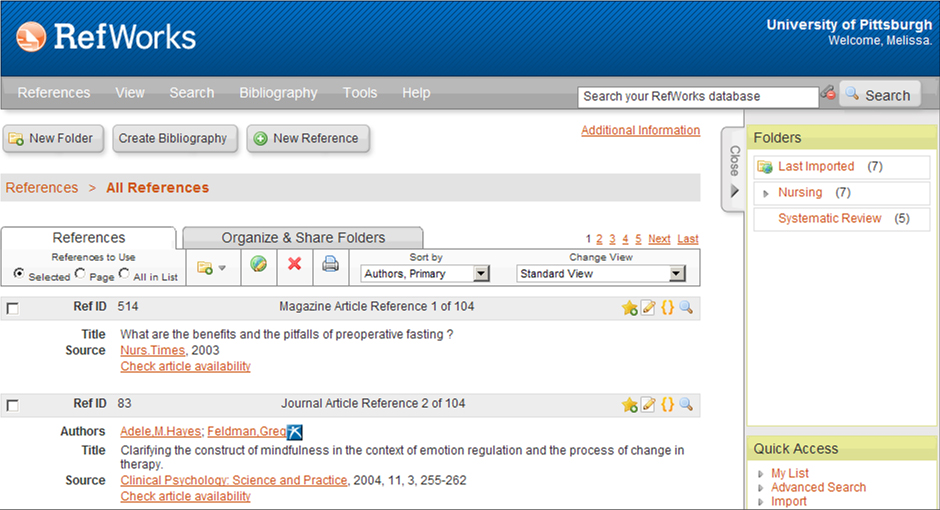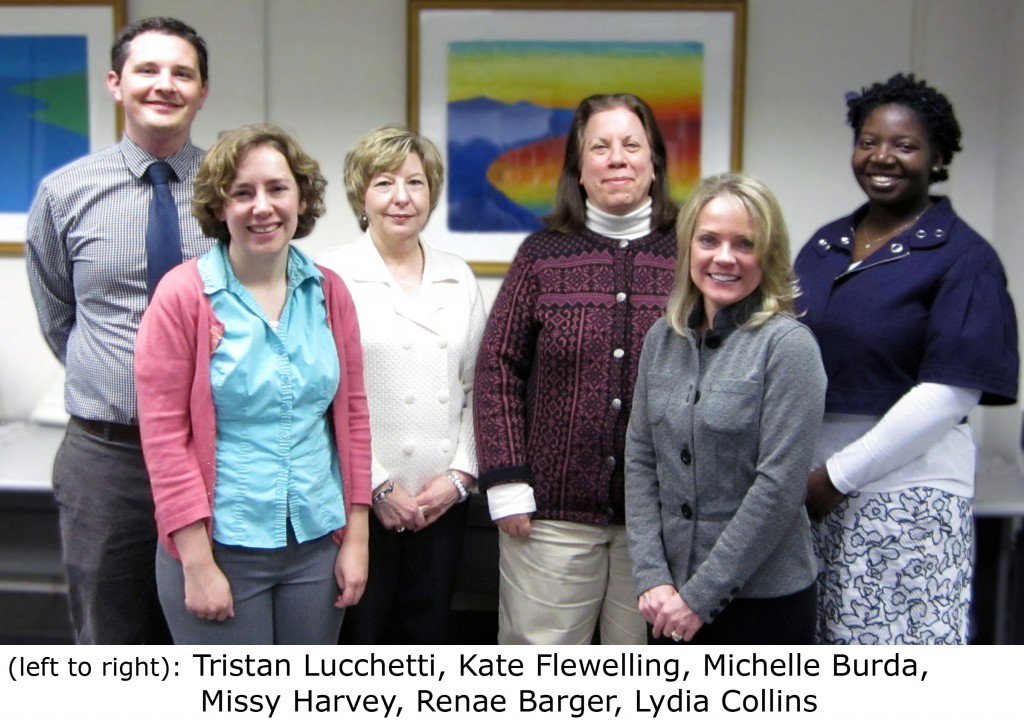In May 2012, construction will begin on the upper floor of Falk Library. The new construction will include a remodeled CMC Help Desk, office space for the staff of National Network of Libraries of Medicine Middle Atlantic Region, an updated computer classroom, and four new group study rooms. Stay tuned for more details.
NN/LM MAR Children’s Outreach Activities
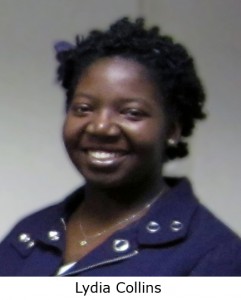 As the new Consumer Health Coordinator, for the National Network of Libraries of Medicine, Middle Atlantic Region, my work has led me directly into the communities we serve. There are several projects that have allowed me to witness first-hand the benefits of being in such a position. In January 2012, in collaboration with the staff of the Carnegie Library of Pittsburgh’s Hazelwood Branch, the program School Age Fun: Healthy Bingo and More! was developed and presented to neighborhood children and also at the local branch of the YMCA of Greater Pittsburgh.
As the new Consumer Health Coordinator, for the National Network of Libraries of Medicine, Middle Atlantic Region, my work has led me directly into the communities we serve. There are several projects that have allowed me to witness first-hand the benefits of being in such a position. In January 2012, in collaboration with the staff of the Carnegie Library of Pittsburgh’s Hazelwood Branch, the program School Age Fun: Healthy Bingo and More! was developed and presented to neighborhood children and also at the local branch of the YMCA of Greater Pittsburgh.
This was an opportunity to introduce school-aged children to the idea of establishing healthy habits for the New Year as well as provide training for library staff on integrating child-oriented health information resources provided by the National Library of Medicine (NLM) into story times and programming. Attendees ranged in age from five to twelve. Children were active participants in a Healthy Bingo game that focused on making healthy food choices; learned about proper hand washing techniques through stories and games; and explored the fun and informative MedlinePlus feature Videos & Cool Tools, which provides access to a variety of freely available, online health-related games and quizzes.
Plans for the future include further promotion of NLM resources that are geared toward children within the Middle Atlantic Region’s schools, public libraries, and community organizations. It is my hope that we can expose as many children as possible to the idea that living a healthy lifestyle is attainable. With access to fun events and freely available resources directly in their communities, I believe anything is possible.
~ Lydia Collins
Let’s Not Do Lunch: Let’s Try Something Different Instead
For the past seven years, HSLS patrons have had a standing invitation to Lunch with a Librarian (LWAL). This occasional series of noontime talks has been an informal way for us to demonstrate tools and techniques for finding and using information important to your work.
Some LWAL topics have enjoyed perennial popularity: “The Nuts and Bolts of Publishing an Article,” “Finding Full-Text Articles,” “Using Cited References to Identify Research Literature,” and “Grant Resources on the Web.” Others, such as “Twitter” and “Making a Dent in Your Personal Paper Silo,” have been added as social media tools became available.
It has been a good run, and the Lunching Librarian has enjoyed interacting with students, faculty, and staff in a low-key format. But now, the Lunching Librarian is going on hiatus.
Much has changed since 2005. When long-time faculty apologize for not visiting the library as they used to, we say that means that we are doing our job. You’re consuming and creating more information electronically, and we are spending more of our time in front of the screen, advising you via e-mail or chat reference. And we are all busier: academic health sciences libraries across the country recognize how difficult it can be for patrons to block out time for a scheduled library class or presentation.
So beginning this summer, we will be experimenting with new ways to deliver our content. We are currently envisioning what these will look like. We hope to make our teaching more responsive to your information needs. If you have any ideas or requests along these lines, please contact us at 412-648-8866 or e-mail medlibq@pitt.edu.
Some things won’t change, such as Wednesday afternoon training workshops on molecular biology topics. And we will still make sure that you know how to use EndNote and find full-text articles.
We’ll miss those lunch dates. But we’ll always have PubMed.
~ Patricia Weiss
HSLS Staff News
The HSLS Staff News section includes recent HSLS presentations, publications, staff changes, staff promotions, degrees earned, etc.
News
Charles Wessel, formerly head of Hospital Services, will now serve as head of Access Services. His areas of responsibility include the library’s circulation and document delivery departments, as well as stacks and space management, and onsite and remote storage facilities.
Publications
Jonathon Erlen, history of medicine librarian, served as a major contributor to “ISIS Current Bibliography of the History of Science and Its Cultural Influences 2011.” Chicago: University of Chicago Press, 2012.
Leslie Czechowski, assistant director, Special Projects, Malgorzata Fort, head, Digital Resource Development, and Geoffrey Spear, metadata manager, published “Implementing a New ERMS & Link Resolver to Better Manage E-Resources” in Serials Review, 2012.
Presentations
Jonathon Erlen, history of medicine librarian, presented a talk, “Human Experimentation in 20th Century American Medicine: Myths and Realities,” at the Honors College and History Department, Florida Gulf Coast University, Ft. Meyers, FL, on January 27, 2012, and at the Department of General Internal Medicine Grand Rounds, Emory University School of Medicine, Atlanta, GA, on March 1, 2012.
Classes May-June 2012
HSLS offers classes on database searching, software applications such as Adobe Photoshop, bibliographic management, molecular biology and genetics, and library orientations. For more information, visit the online course descriptions.
Classes are held on the first floor of Falk Library (200 Scaife Hall) in Classroom 1 and Conference Room B. All classes are open to faculty, staff and students of the schools of the health sciences at the University of Pittsburgh.
No registration is required for any of these classes. Seating for classes is first-come, first-served, until the class is full. Classes marked with an asterisk (*) qualify for American Medical Association Category 2 continuing education credit.
Class schedules are subject to change. Please consult the online class calendar for the most current information.
You will need a valid Pitt ID or e-mail address to attend these classes.
HSLS ORIENTATION
Introduction to HSLS Resources and Services at Falk Library
(Meet inside entrance to Library)
| Monday, May 14 | 9-10 a.m. |
Also offered upon request to groups or individuals. Call 412-648-8866.
SEARCHING DATABASES
Painless PubMed* (Falk Library Classroom 1)
| Friday, May 4 | 2-3 p.m. |
| Thursday, May 10 | 8-9 a.m. |
| Wednesday, May 16 | 11 a.m.-noon |
| Monday, May 21 | 3:30-4:30 p.m. |
| Tuesday, May 29 | 1-2 p.m. |
| Wednesday, June 6 | 1:30-2:30 p.m. |
| Friday, June 15 | 9-10 a.m. |
| Tuesday, June 19 | 4-5 p.m. |
| Thursday, June 28 | noon-1 p.m. |
MOLECULAR BIOLOGY AND GENETICS RESOURCES
Cancer Informatics* (Falk Library Conference Room B)
| Wednesday, May 9 | 1-3 p.m. |
Introduction to CLC Main Workbench* (Falk Library Classroom 2)
| Wednesday, June 20 | 1-3 p.m. |
SOFTWARE TRAINING
EndNote Basics (Falk Library Classroom 2)
(Note: This class is usually full. Please arrive 15 minutes in advance to ensure seating.)
| Monday, May 21 | 9:30-11:30 a.m. |
| Tuesday, June 12 | 10:30 a.m.-12:30 p.m. |
PowerPoint for Beginners (Falk Library Classroom 1)
| Monday, May 7 | noon-2 p.m. |
Advanced PowerPoint for Presentations(Falk Library Classroom 2)
| Monday, May 21 | noon-2 p.m. |
The WOW Factor: PowerPoint for Posters(Falk Library Classroom 2)
| Monday, June 4 | noon-2 p.m. |
CUSTOMIZED CLASSES
Customized classes can be developed for your department, course, or other group.
LEARNING @ YOUR PACE
These online tutorials provide information on getting started at HSLS, focusing on the Web site and popular resources.
Against the Odds Lecture: “Global Health in a Wartime Setting—Iraq”
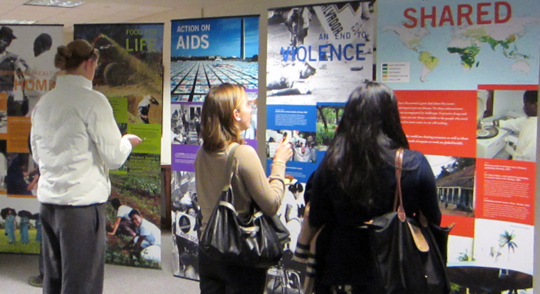 On January 19, 2012, HSLS hosted a lecture by Samuel Watson on “Global Health in a Wartime Setting—Iraq,” followed by a panel discussion with Watson, Taylor Seybolt, PhD, and Elliott Larson, MD. This event was held in conjunction with the National Library of Medicine’s traveling exhibit, “Against the Odds: Making a Difference in Global Health.” The exhibition is available for public viewing in Falk Library until February 25, 2012, during library hours.
On January 19, 2012, HSLS hosted a lecture by Samuel Watson on “Global Health in a Wartime Setting—Iraq,” followed by a panel discussion with Watson, Taylor Seybolt, PhD, and Elliott Larson, MD. This event was held in conjunction with the National Library of Medicine’s traveling exhibit, “Against the Odds: Making a Difference in Global Health.” The exhibition is available for public viewing in Falk Library until February 25, 2012, during library hours.
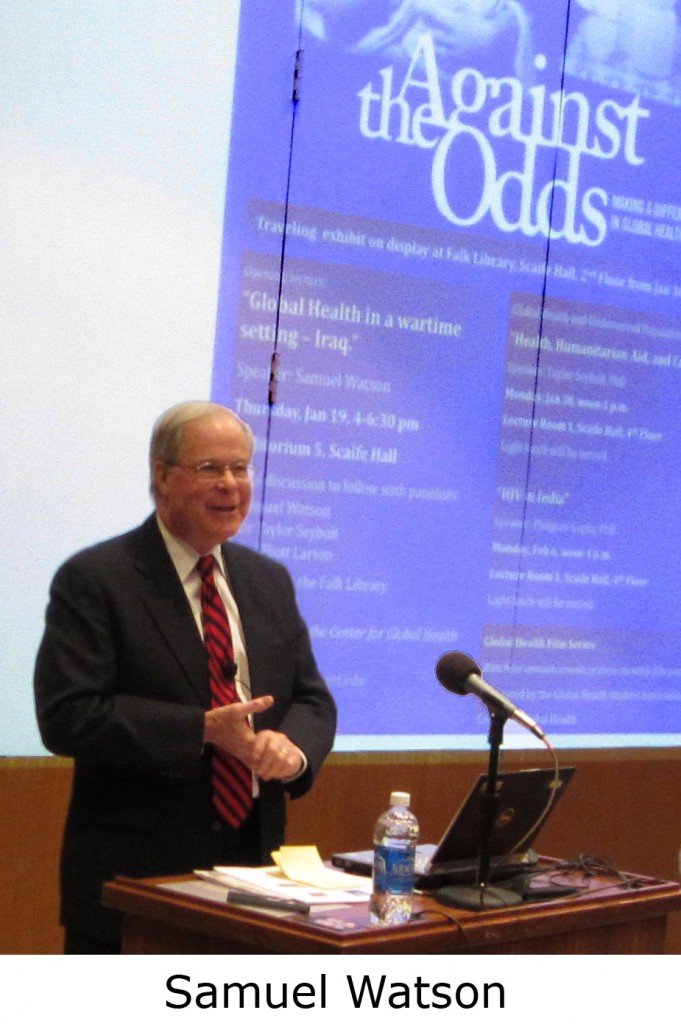 The talk expanded on one of the exhibit themes, the effects of conflict on health. Watson served as a member of a Provincial Reconstruction Team (PRT) in Diwaniyah Province, south of Bagdad in rural Iraq. PRTs in Iraq included U.S. military and State Department personnel. They’re goal was to build relationships with local government, improve local governance and infrastructure, and promote humanitarian projects funded by the United States. The talk highlighted the day-to-day difficulties of doing this work in an active war zone. As one of the 10 public health advisors in a PRT in Iraq, Watson identified many more public health problems than could be addressed by the PRT. Among the pressing problems in the province were access to clean water and nutritious food, and a crumbling health infrastructure. Initiatives undertaken in the province to improve health included distribution of vaccines during H1N1 influenza and measles outbreaks, and the training of health personnel, such as midwives.
The talk expanded on one of the exhibit themes, the effects of conflict on health. Watson served as a member of a Provincial Reconstruction Team (PRT) in Diwaniyah Province, south of Bagdad in rural Iraq. PRTs in Iraq included U.S. military and State Department personnel. They’re goal was to build relationships with local government, improve local governance and infrastructure, and promote humanitarian projects funded by the United States. The talk highlighted the day-to-day difficulties of doing this work in an active war zone. As one of the 10 public health advisors in a PRT in Iraq, Watson identified many more public health problems than could be addressed by the PRT. Among the pressing problems in the province were access to clean water and nutritious food, and a crumbling health infrastructure. Initiatives undertaken in the province to improve health included distribution of vaccines during H1N1 influenza and measles outbreaks, and the training of health personnel, such as midwives.
The panel discussion and questions and answer session, moderated by Donald Burke, Dean of the Graduate School of Public Health, provided more perspectives on the context of public health work during wars. Larson discussed his experience working as a physician in Afghanistan, comparing it to Iraq. He noting that PRTs are employed in Afghanistan, but that unlike Iraq, there are a number of other international aid agencies working as well. Seybolt provided information on U.S. policy and PRTs, setting the remarks of the other panelists in a broader public policy context.
This event was funded by HSLS, the Center for Global Health at the University of Pittsburgh, and the National Network of Libraries of Medicine, Middle Atlantic Region.
~ Barb Folb
Director’s Reflections…HSLS and UPMC: A Change in Focus
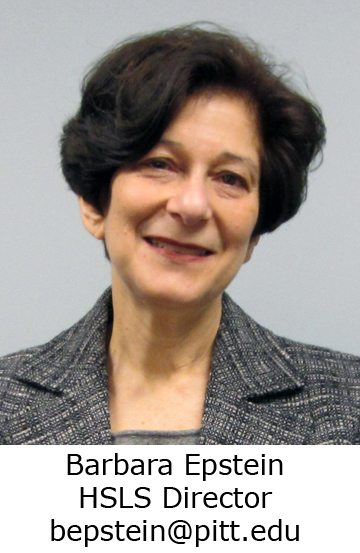 In late January, we distributed a “special edition” of the Update to our UPMC and University of Pittsburgh subscribers, in which we outlined a significant change in the scope of HSLS services available to the UPMC community. While UPMC staff continue to have uninterrupted access to HSLS’ wide range of valued clinical e-resources, services provided by HSLS librarians and staff are no longer offered to UPMC library users. These services include circulation of print books and laptops, access to Falk Library’s computers, admission to classes in Falk Library, interlibrary loan and document delivery, and information services. HSLS librarians will provide assistance with access problems related to electronic resources, but requests for user instruction and reference consultation are the responsibility of UPMC hospital librarians.
In late January, we distributed a “special edition” of the Update to our UPMC and University of Pittsburgh subscribers, in which we outlined a significant change in the scope of HSLS services available to the UPMC community. While UPMC staff continue to have uninterrupted access to HSLS’ wide range of valued clinical e-resources, services provided by HSLS librarians and staff are no longer offered to UPMC library users. These services include circulation of print books and laptops, access to Falk Library’s computers, admission to classes in Falk Library, interlibrary loan and document delivery, and information services. HSLS librarians will provide assistance with access problems related to electronic resources, but requests for user instruction and reference consultation are the responsibility of UPMC hospital librarians.
I want to stress, however, that there is no change in services or access for University of Pittsburgh faculty and students with a personal e-mail account ending in @pitt.edu. Many UPMC physicians have full or affiliate/volunteer faculty appointments, but are not accustomed to using their Pitt e-mail accounts, and/or haven’t picked up their current Pitt ID cards. As the scope of HSLS services changes, you will need a Pitt ID to borrow books, and be admitted to classes in Falk Library. If you created an HSLS Document Delivery account with your UPMC e-mail address, you will need to re-register with your Pitt e-mail. Molecular Biology information services and software will be available only to University of Pittsburgh users.
If you haven’t done so already, I strongly urge eligible faculty to activate your Pitt e-mail account, and find some time to stop by Panther Central in the lobby of the Litchfield Towers (open daily from 7:30 a.m. to 10 p.m.) to pick up a current photo ID. For information and assistance in managing your Pitt e-mail account, contact the Pitt Technology Helpdesk at 412-624-HELP [4357] or direct your browser to http://www.technology.pitt.edu/helprequest/.
I realize these changes may be difficult for UPMC clinicians and even to some Pitt users. They are equally challenging to HSLS librarians and staff members, who are accustomed to offering the same high level of services to all of our user population. We are committed to making this transition as painless as possible, and I welcome your suggestions.
Expanded Access to American Medical Association E-Journals
HSLS recently expanded full-text access to all e-journals published by the American Medical Association (AMA). HSLS has subscribed to the electronic version of these journals for many years, but previously only provided access dating back to 1998. Access to each AMA journal is now available from volume 1, issue 1, through the present. Details of the expanded collection are below:
- JAMA, 1883–present
- Archives of Dermatology, 1920–present
- Archives of Facial Plastic Surgery, 1999–present
- Archives of Family Medicine, 1992–2000
- Archives of General Psychiatry, 1959–present
- Archives of Internal Medicine, 1908–present
- Archives of Neurology, 1959–present
- Archives of Neurology & Psychiatry, 1919–1958
- Archives of Pediatrics & Adolescent Medicine, 1911–present
- Archives of Ophthalmology, 1929–present
- Archives of Otolaryngology-Head & Neck Surgery, 1925–present
- Archives of Surgery, 1920–present
- Disaster Medicine and Public Health Preparedness, 2007–present
Many of the AMA journals have undergone minor title changes over the years. However, once you access the Web page for a particular journal, the full run will appear as a single display.
To access an AMA e-journal, type the journal name in the search.HSLS box on the HSLS home page or browse the HSLS E-Journals A-Z list. For questions, contact the Main Desk at 412-648-8866 or e-mail Ask A Librarian.
~Jeff Husted
New Enhancements to RefWorks
RefWorks, the Web-based software package for managing citations and creating bibliographies, has recently been updated. The new RefWorks 2.0 version has a streamlined look with fewer menus and intuitive navigation buttons. Features that make RefWorks so useful, such as the ability to share citations with your colleagues, have been brought to the front page, enabling users to complete tasks quickly.
Other improvements include:
- The availability of subfolders to easily organize citations
- One click access to the one line/cite view option
- The My List feature which allows citations to be brought together into a temporary folder
- Duplicate citations within a folder can now be removed
- A new side Quick Access bar that can be minimized
You can view this short preview video that outlines many of the new RefWorks 2.0 features.
All citations originally stored using the “classic” version of Reworks will remain accessible in the RefWorks 2.0 version.
RefWorks is currently working on a new version of Write-N-Cite, the software needed to create bibliographies. Until it is released, Refworks 2.0 users may continue to use Write-N-Cite III for Windows.
To access RefWorks 2.0, type “RefWorks” in the Pitt Resources Quick Search box. New users must sign up for an account on the RefWorks login page.
~ Melissa Ratajeski
QR Codes Explained
You see them in magazines, bus stops, and now at Falk Library, but do you know what those unusual looking black and white graphics are? Continue reading
Changes in HSLS Collections for 2012
Building a library collection is a complicated process of balancing the needs of a diverse user population, a finite budget, and subscription charges that continue to escalate, even in this difficult economy. In our case, there is little room to cut costs, as our lesser-used resources have already been canceled in the past few years. Faced with publisher increases in excess of the general inflation rate, however, we have no choice but to continue to trim our collection. This process is made more difficult because many publisher packages do not permit us to cancel a large number of titles.
Below is a list of canceled e-journals, print journals and e-books. Cancellation decisions were based on a combination of metrics including usage statistics, cost, cost-per-use, cost increase, impact factor, impact factor rank, document delivery/interlibrary loan statistics, the editorial board and publisher, and the number of articles written by the University of Pittsburgh community. The savings realized through these cancelations allow us to absorb the cost increases for our remaining journal titles. Happily, we were able to add or re-instate 31 e-journal titles, mostly by swapping out little-used titles in journal packages.
The following electronic journals were cancelled for 2012. University of Pittsburgh users may order individual articles for a small fee through the HSLS Document Delivery Service.
- Advances in Anesthesia
- Advances in Pediatrics
- Air Medical Journal
- American Journal of Psychoanalysis
- American Journal of Rhinology & Allergy
- Audiology and Neuro-otology
- Cancer Epidemiology
- Cardiology
- Chemotherapy
- Connective Tissue Research
- Cryobiology
- Current Problems in Cancer
- Current Problems in Cardiology
- Cytogenetic and Genome Research
- International Archives of Allergy & Immunology
- International Journal of Radiation Biology
- International Journal of STD & AIDS
- Journal of Investigative Surgery
- Journal of Psychosocial Oncology
- Journal of Rehabilitation Medicine
- Journal of the Royal Society of Medicine
- Neuroendocrinology
- Nutrition and Cancer
- Orbit
- Renal Failure
- Research in Social & Administrative Pharmacy
- Seminars in Orthodontics
- Twin Research and Human Genetics
The following print journals were cancelled for 2012:
- American Journal of Health Promotion
- American Journal of Orthopedics
- Annals of Otology, Rhinology, & Laryngology
- Canadian Journal of Gastroenterology
- Child & Adolescent Psychiatric Clinics of North America
- Ethnicity & Disease
- Hand Clinics
- Journal of Wound Care
- Neuroimaging Clinics of North America
- Neurosurgery Clinics of North America
The following subscription e-books were cancelled for 2012:
- Danforth’s Obstetrics & Gynecology
- Drug Facts and Comparisons, Pocket Version
- Duane’s Ophthalmology
- Fundamental Immunology
- Manual of Clinical Oncology
- Merritt’s Neurology
- Modern Epidemiology
- Professional Guide to Signs & Symptoms
- The 5-Minute Clinical Consult
- Washington Manual of Surgery
The following electronic journals have been added to the HSLS collection for 2012:
- Alzheimer’s & Dementia
- Annals of Pharmacotherapy*
- Autism Research
- Bone Key
- Brain Stimulation
- Clinical Practice Neurology
- EMBO Molecular Medicine
- European Journal of Preventive Cardiology
- Inflammatory Bowel Diseases
- Influenza & Other Respiratory Viruses
- JACC. Cardiovascular Imaging
- Journal for Healthcare Quality
- Journal for the Education of the Gifted
- Journal of Cellular & Molecular Medicine
- Journal of Generic Medicines
- Journal of Hospital Medicine
- Journal of Medical Marketing
- Journal of Tissue Engineering & Regenerative Medicine
- Journal of Veterinary Diagnostic Investigation
- Laryngoscope*
- Mitochondrion
- Mount Sinai Journal of Medicine
- Operative Techniques in Orthopaedics
- Otolaryngology—Head and Neck Surgery*
- Paediatric Respiratory Reviews
- Pain Management Nursing
- Pediatric Obesity
- PM&R
- Prosthetics & Orthotics International
- Psychiatric Services*
- Wilderness & Environmental Medicine
* reinstated for 2012
Visual Literacy: A New Prerequisite for Health Sciences Education?
Can formal training in art and visual thinking strategies help to improve:
- Visual diagnostic skills of medical students?
- Clinical observation skills of primary care physicians and nurses?
- Communication among members of inter-professional health teams?
The answer is yes, according to these research examples1,2,3 and other studies which sought to enhance clinical practice by improving the visual literacy skills of students and health professionals.
Visual literacy is a two-sided concept, involving the abilities to both decode (make meaning from visual messages), and to encode (compose meaningful visuals).4 It entails “a set of abilities that enables an individual to effectively find, interpret, evaluate, use, and create images and visual media. Visual literacy skills equip a learner to understand and analyze the contextual, cultural, ethical, aesthetic, intellectual, and technical components involved in the production and use of visual materials.”5 Some examples include evaluating the factual accuracy of an image; determining cultural, ethical, political, and historical significance; comprehending graphs and charts; evaluating aesthetics and design principles; and understanding copyright, all concurrent with developing technical proficiencies to create or choose images appropriate for a given need.
The fading notion of the ‘digital-native’ student arriving on campus already equipped with these abilities has caused educators and librarians to recognize an emerging need for visual literacy skills instruction, support, and curriculum integration. Just as visually-oriented technologies (e.g., mobile devices, Web, video) are creating a culture shift away from text, some educators are calling for a similar move away from the predominantly text-based methods of instruction. As a result, curricula infused with visual literacy components are appearing in schools of medicine and nursing, as well as courses in molecular and cellular biosciences, and biology.
Librarians have also responded to this need by developing the Visual Literacy Competency Standards for Higher Education, published by the Association of College and Research Libraries in October 2011. These new Standards recognize “[T]he importance of images and visual media in contemporary culture is changing what it means to be literate in the 21st century. Yet the pervasiveness of images and visual media does not necessarily mean that individuals are able to critically view, use, and produce visual content. Individuals must develop these essential skills in order to engage capably in a visually-oriented society.” Librarians and educators can use the Standards to “articulate observable learning outcomes that can be taught and assessed, supporting efforts to develop measurable improvements in student visual literacy.”6
- Naghshineh S, Hafler JP, Miller AR, Blanco MA, et al. “Formal Art Observation Training Improves Medical Students’ Visual Diagnostic Skills,” Journal of General Internal Medicine 23, no. 7 (2008 Jul):991-7.
- Kirklin D, Duncan J, McBride S, et al. “Cluster Design Controlled Trial of Arts-Based Observational Skills Training in Primary Care,” Medical Education, 41, no. 4 (2007 Apr): 395-401.
- Klugman CM, Peel J, Beckmann-Mendez D. “Art Rounds: Teaching Interprofessional Students Visual Thinking Strategies at One School,” Academic Medicine 86, no. 10 (2011 Oct):1266-71.
- Metros SE. “The Educator’s Role in Preparing Visually Literate Learners,” Theory into Practice 47, no. 2 (2008):102-9.
- ACRL Visual Literacy Competency Standards for Higher Education. Chicago: American Library Association. 1997–2012. Oct 2011 [cited 2012 Jan 12]. Available from: http://www.ala.org/acrl/standards/visualliteracy.
- Ibid.
~ Rebecca Abromitis
Treasures from the Rare Book Room: Photography and Medical Books, Part 3
The third part of this series on the use of photography in medical books continues to explore outstanding examples from the Falk Library historical collection. This issue features an exquisite atlas of stereoscopic images for studying hernia, titled Stereoskopbilder zur Lehre von den Hernien by Eugen Enderlen and Emil Gasser, published in 1906.
 Stereoscopy is a technique for creating depth in an image by presenting two offset images separately to the left and right eye of the viewer. In 1838, Charles Wheatstone showed that the illusion of depth can be created from flat pictures that differed only in horizontal disparity. Stereoscopy became popular after 1849 with the invention of the prism stereoscope by David Brewster. Photography popularized stereograms (side-by-side pictures) even more. Since objects could be experienced in 3-D, stereoscopic images became widely used in books about geography, history, and medicine, among other subjects.
Stereoscopy is a technique for creating depth in an image by presenting two offset images separately to the left and right eye of the viewer. In 1838, Charles Wheatstone showed that the illusion of depth can be created from flat pictures that differed only in horizontal disparity. Stereoscopy became popular after 1849 with the invention of the prism stereoscope by David Brewster. Photography popularized stereograms (side-by-side pictures) even more. Since objects could be experienced in 3-D, stereoscopic images became widely used in books about geography, history, and medicine, among other subjects.
Sterreoskopbilder zur Lehre von den Hernien is an example of the cooperation between surgeon Eugen Enderlen and anatomist Emil Gasser. It includes photographs of dissected preparations that illustrate the anatomy of hernias. They come from what is known today as the Gasser-Strahl collection in the Anatomical Institute at the Philipps University in Marburg, Germany. The atlas consists of 72 pages of text and 17 cardboard slide holders which contain 72 side-by-side photographs. Each pair of images is matched with a corresponding description on the opposite page. For purposes of clarity, some of the photographs were enhanced with color. The same color code was used throughout the atlas: red for arteries, blue for veins, and yellow for nerves. When adding color was superfluous, the images were left unchanged. As intended by the authors, the atlas can be viewed using any standard stereoscope. However the naked eye can be trained to perceive the depth of stereoscopic pictures and give the user the illusion of a 3-D image without the use of a stereoscope.
The book is located in the Rare Books Room at Falk Library and can be viewed by appointment.
Part 1 of this series appeared in the October 2011 HSLS Update and explored the first applications of photography in medicine; while Part 2, in the December 2011 issue, examined photography in the service of medical advertisement.
~ Gosia Fort
NN/LM MAR Is Now Fully Staffed
With the addition of Michelle Burda, Network and Advocacy Coordinator, we are pleased to announce the MAR is now fully staffed.
Michelle will plan Network member programs, with an emphasis on advocacy and changing roles for the information professional; coordinate outreach activities to hospital librarians; and manage the Region’s membership and DOCLINE program.
Michelle has spent the past 17 years in a hospital library, first as a medical librarian, and then as library director. Her most recent position was as reference and consumer health librarian at the UPMC Shadyside Libraries.
To meet the rest of the staff, please see the December 2011 HSLS Update article, “Meet the Staff of the National Network of Libraries of Medicine, Middle Atlantic Region.”
As a regional medical library, our outreach mandate includes offering awards for specialized projects and technology, along with providing support and training opportunities to health sciences librarians, unaffiliated health professionals and consumer populations. In December, we provided funding (http://nnlm.gov/mar/funding/funded.html), ranging from $2,000-$10,000, for 35 member projects to support such efforts.
Currently, we are in the process of forming our Special Advisory Groups and the Regional Advisory Committee. These groups will provide valuable guidance for MAR programs and activities. In March and April, committee members will meet in Pittsburgh.
~ Renae Barger

